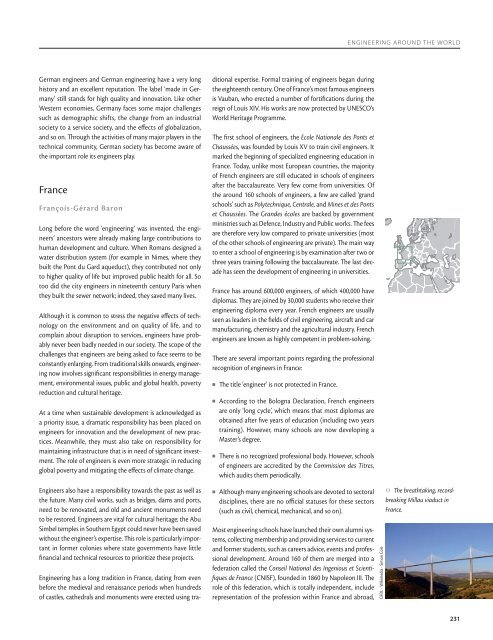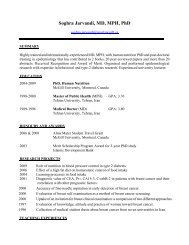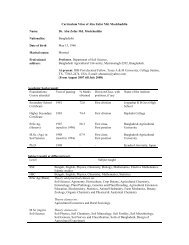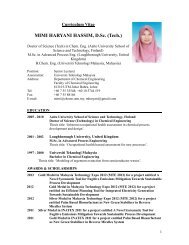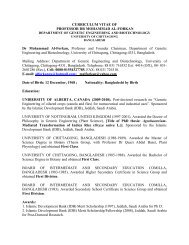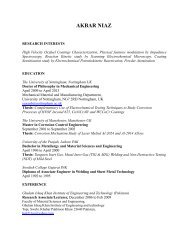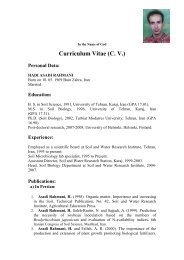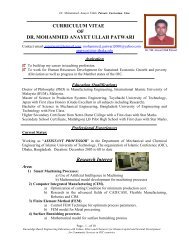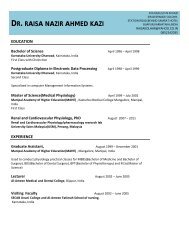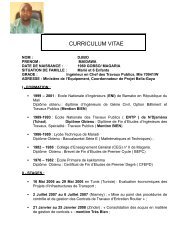Engineering: issues, challenges and opportunities for development ...
Engineering: issues, challenges and opportunities for development ...
Engineering: issues, challenges and opportunities for development ...
You also want an ePaper? Increase the reach of your titles
YUMPU automatically turns print PDFs into web optimized ePapers that Google loves.
ENGINEERING AROUND THE WORLDGerman engineers <strong>and</strong> German engineering have a very longhistory <strong>and</strong> an excellent reputation. The label ‘made in Germany’still st<strong>and</strong>s <strong>for</strong> high quality <strong>and</strong> innovation. Like otherWestern economies, Germany faces some major <strong>challenges</strong>such as demographic shifts, the change from an industrialsociety to a service society, <strong>and</strong> the effects of globalization,<strong>and</strong> so on. Through the activities of many major players in thetechnical community, German society has become aware ofthe important role its engineers play.FranceFrançois-Gérard BaronLong be<strong>for</strong>e the word ‘engineering’ was invented, the engineers’ancestors were already making large contributions tohuman <strong>development</strong> <strong>and</strong> culture. When Romans designed awater distribution system (<strong>for</strong> example in Nimes, where theybuilt the Pont du Gard aqueduct), they contributed not onlyto higher quality of life but improved public health <strong>for</strong> all. Sotoo did the city engineers in nineteenth century Paris whenthey built the sewer network; indeed, they saved many lives.Although it is common to stress the negative effects of technologyon the environment <strong>and</strong> on quality of life, <strong>and</strong> tocomplain about disruption to services, engineers have probablynever been badly needed in our society. The scope of the<strong>challenges</strong> that engineers are being asked to face seems to beconstantly enlarging. From traditional skills onwards, engineeringnow involves significant responsibilities in energy management,environmental <strong>issues</strong>, public <strong>and</strong> global health, povertyreduction <strong>and</strong> cultural heritage.At a time when sustainable <strong>development</strong> is acknowledged asa priority issue, a dramatic responsibility has been placed onengineers <strong>for</strong> innovation <strong>and</strong> the <strong>development</strong> of new practices.Meanwhile, they must also take on responsibility <strong>for</strong>maintaining infrastructure that is in need of significant investment.The role of engineers is even more strategic in reducingglobal poverty <strong>and</strong> mitigating the effects of climate change.Engineers also have a responsibility towards the past as well asthe future. Many civil works, such as bridges, dams <strong>and</strong> ports,need to be renovated, <strong>and</strong> old <strong>and</strong> ancient monuments needto be restored. Engineers are vital <strong>for</strong> cultural heritage; the AbuSimbel temples in Southern Egypt could never have been savedwithout the engineer’s expertise. This role is particularly importantin <strong>for</strong>mer colonies where state governments have littlefinancial <strong>and</strong> technical resources to prioritize these projects.<strong>Engineering</strong> has a long tradition in France, dating from evenbe<strong>for</strong>e the medieval <strong>and</strong> renaissance periods when hundredsof castles, cathedrals <strong>and</strong> monuments were erected using traditionalexpertise. Formal training of engineers began duringthe eighteenth century. One of France’s most famous engineersis Vauban, who erected a number of <strong>for</strong>tifications during thereign of Louis XIV. His works are now protected by UNESCO’sWorld Heritage Programme.The first school of engineers, the Ecole Nationale des Ponts etChaussées, was founded by Louis XV to train civil engineers. Itmarked the beginning of specialized engineering education inFrance. Today, unlike most European countries, the majorityof French engineers are still educated in schools of engineersafter the baccalaureate. Very few come from universities. Ofthe around 160 schools of engineers, a few are called ‘gr<strong>and</strong>schools’ such as Polytechnique, Centrale, <strong>and</strong> Mines et des Pontset Chaussées. The Gr<strong>and</strong>es écoles are backed by governmentministries such as Defence, Industry <strong>and</strong> Public works. The feesare there<strong>for</strong>e very low compared to private universities (mostof the other schools of engineering are private). The main wayto enter a school of engineering is by examination after two orthree years training following the baccalaureate. The last decadehas seen the <strong>development</strong> of engineering in universities.France has around 600,000 engineers, of which 400,000 havediplomas. They are joined by 30,000 students who receive theirengineering diploma every year. French engineers are usuallyseen as leaders in the fields of civil engineering, aircraft <strong>and</strong> carmanufacturing, chemistry <strong>and</strong> the agricultural industry. Frenchengineers are known as highly competent in problem-solving.There are several important points regarding the professionalrecognition of engineers in France:■■■■The title ‘engineer’ is not protected in France.According to the Bologna Declaration, French engineersare only ‘long cycle’, which means that most diplomas areobtained after five years of education (including two yearstraining). However, many schools are now developing aMaster’s degree.There is no recognized professional body. However, schoolsof engineers are accredited by the Commission des Titres,which audits them periodically.Although many engineering schools are devoted to sectoraldisciplines, there are no official statuses <strong>for</strong> these sectors(such as civil, chemical, mechanical, <strong>and</strong> so on).Most engineering schools have launched their own alumni systems,collecting membership <strong>and</strong> providing services to current<strong>and</strong> <strong>for</strong>mer students, such as careers advice, events <strong>and</strong> professional<strong>development</strong>. Around 160 of them are merged into afederation called the Conseil National des Ingenious et Scientifiquesde France (CNISF), founded in 1860 by Napoleon III. Therole of this federation, which is totally independent, includerepresentation of the profession within France <strong>and</strong> abroad,GFDL - Wikimedia - Simon Cole The breathtaking, recordbreakingMillau viaduct inFrance.231


